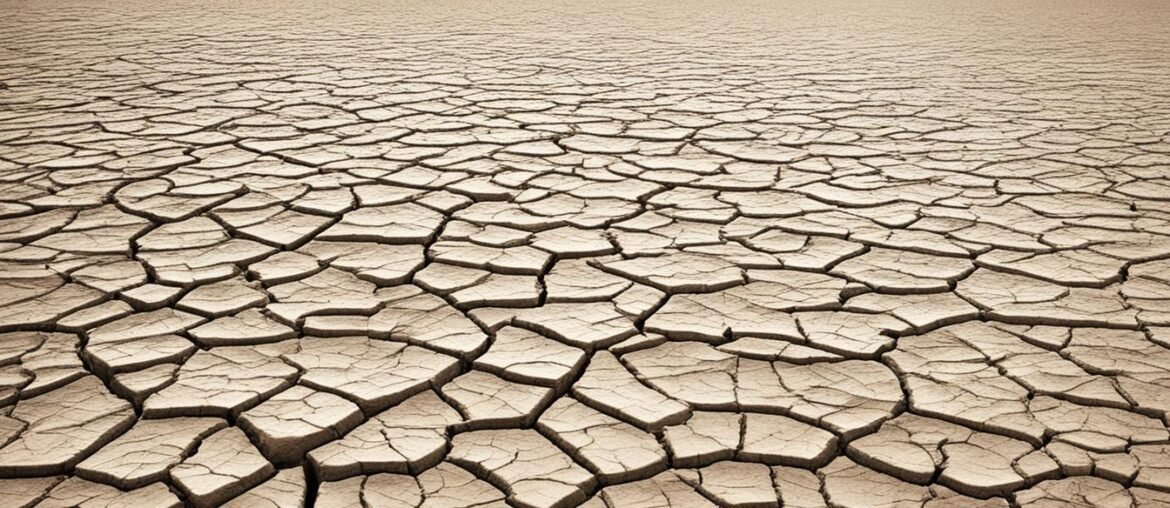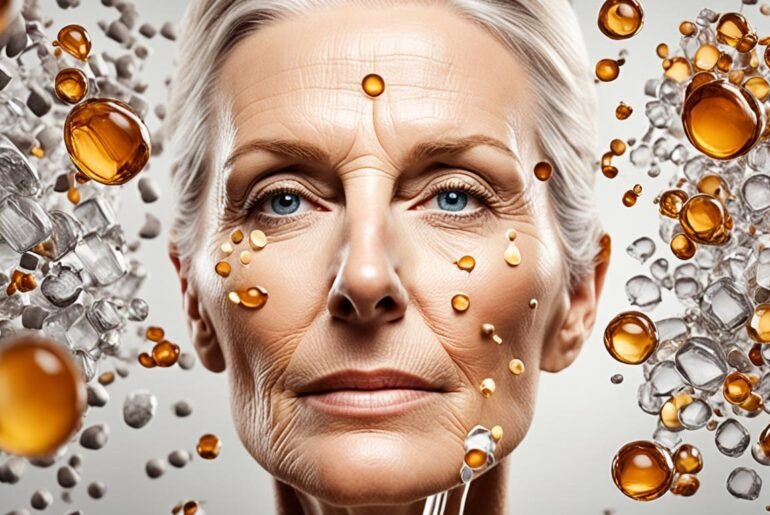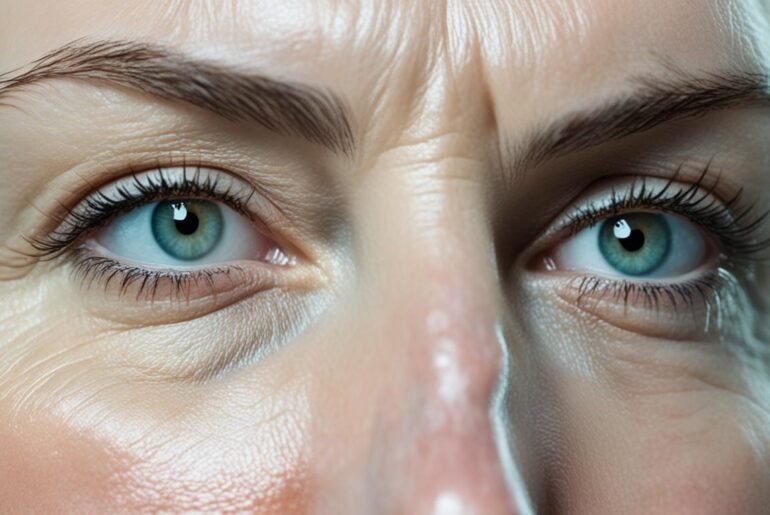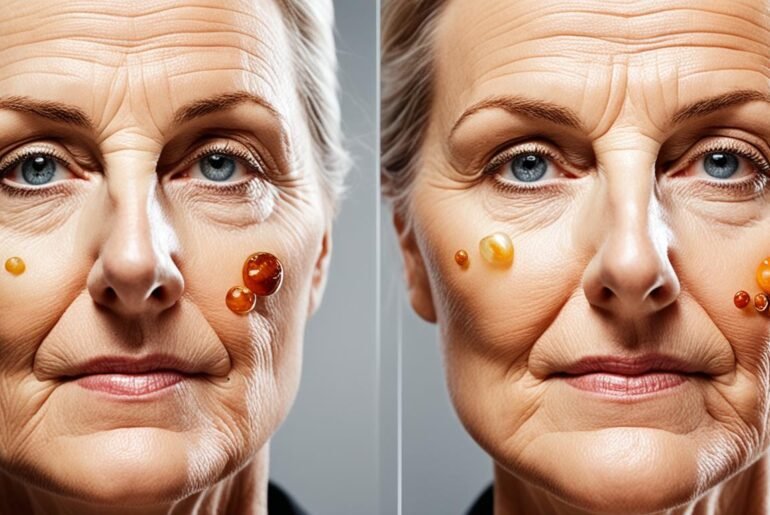Did you know that alcohol consumption can significantly impact the appearance of aging skin? While it’s no secret that excessive drinking can have negative effects on our health, the specific impact on our skin may come as a surprise. Research studies have revealed that alcohol not only contributes to premature aging but also affects the texture, elasticity, and overall appearance of our skin.
Key Takeaways:
- Excessive alcohol consumption can lead to premature aging of the skin.
- Alcohol can cause a loss of skin elasticity and texture.
- Drinking heavily can contribute to the development of wrinkles and fine lines.
- Alcohol-induced skin aging is characterized by upper facial lines, under-eye puffiness, and midface volume loss.
- Reducing alcohol consumption can have significant benefits for skin health and appearance.
The Relationship Between Alcohol and Facial Aging
Facial lines, facial skin aging, impact of tobacco use, impact of alcohol consumption, volume-related aging
A study examining the associations between facial aging and smoking as well as alcohol consumption revealed interesting findings. While smoking was found to be associated with increased severity of various facial characteristics such as forehead lines, crow’s feet, glabellar lines, under-eye puffiness, tear-trough hollowing, and nasolabial folds, heavy alcohol use showed a different impact on facial aging.
Heavy alcohol use was found to be associated with increased severity of upper facial lines, under-eye puffiness, oral commissures, midface volume loss, and visible blood vessels. This suggests that both smoking and alcohol consumption can have an impact on the appearance of aging skin.
Understanding the relationship between alcohol consumption and facial aging can help individuals make informed choices about their lifestyle habits and skincare routines.
Effects of Alcohol on Skin and Aging
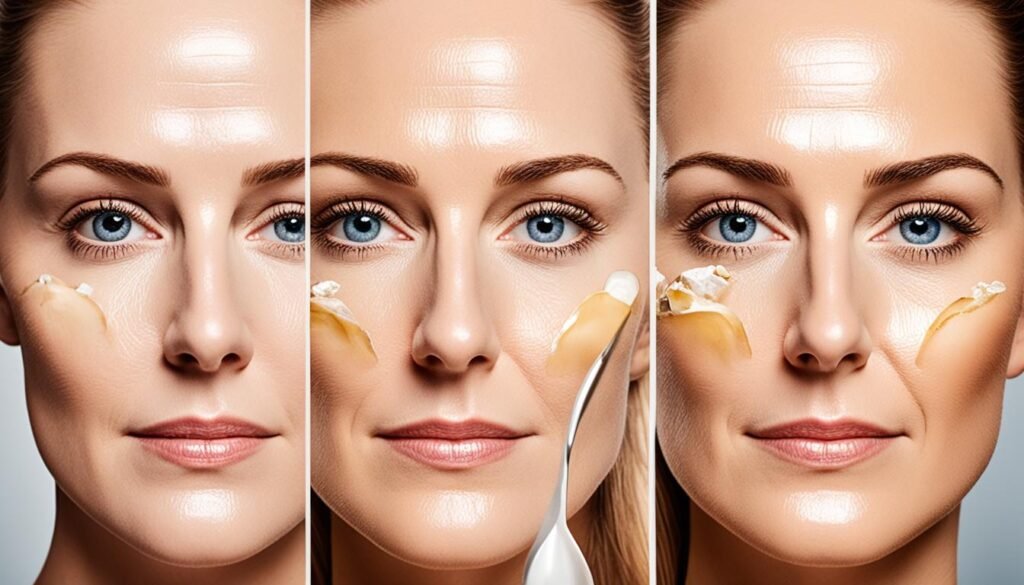
Excessive alcohol consumption can have detrimental effects on the skin. Alcohol depletes levels of vitamins, especially vitamin A, leading to a decrease in collagen levels and loss of skin elasticity. It can also cause dehydration, which can contribute to the formation of wrinkles. Additionally, alcohol can cause inflammation in the skin, leading to redness and flushing. Over time, these effects can contribute to premature aging of the skin.
“Alcohol depletes levels of vitamins, leading to a decrease in collagen levels and loss of skin elasticity.”
When alcohol is consumed, it affects the body in various ways, including the skin. One of the key effects of alcohol on the skin is dehydration. Alcohol is a diuretic, meaning it increases the production of urine, resulting in increased fluid loss from the body. This can lead to dryness and dehydration of the skin, which is a common cause of wrinkles and fine lines.
“Alcohol is a diuretic, leading to increased fluid loss and skin dehydration.”
In addition to dehydration, alcohol consumption can also cause inflammation in the skin. Alcohol is known to trigger an immune response in the body, leading to increased blood flow and dilation of blood vessels. This can result in redness and flushing of the skin, giving it an uneven appearance.
“Alcohol consumption can lead to skin inflammation, resulting in redness and flushing.”
The effects of alcohol on the skin can be even more pronounced when combined with other factors such as smoking, poor diet, and lack of sleep. These factors can exacerbate the negative effects of alcohol on the skin, leading to accelerated aging and a dull complexion.
It is important to note that occasional and moderate alcohol consumption may not have as significant an impact on the skin as excessive or chronic alcohol use. However, it is always advisable to be mindful of alcohol intake and its potential effects on overall health and skin wellness.
| Effects of Alcohol on Skin | Description |
|---|---|
| Dehydration | Alcohol acts as a diuretic, leading to increased fluid loss from the body and dehydrated skin. |
| Wrinkles | Dehydration caused by alcohol can contribute to the formation of wrinkles and fine lines. |
| Inflammation | Alcohol consumption can trigger an immune response, leading to skin inflammation, redness, and flushing. |
Overall, excessive alcohol consumption can have a negative impact on skin health and contribute to premature aging. It is important to maintain a balanced lifestyle, including moderate alcohol consumption, staying hydrated, and practicing good skincare habits, to promote youthful and vibrant-looking skin.
Impact on Sleep and Skin Appearance
Alcohol consumption can have a significant impact on sleep quality, which in turn affects the appearance of the skin. Lack of sufficient sleep is associated with accelerated aging and can contribute to various skin issues. Let’s take a closer look at how alcohol disrupts sleep patterns and its effects on the skin.
When alcohol is consumed before bedtime, it can interfere with the natural sleep cycle, preventing individuals from entering deep sleep stages and achieving restorative rest. This disruption can result in a lack of quality sleep and lead to visible signs of fatigue and aging.
One of the most noticeable effects of alcohol-induced sleep disruption is the appearance of puffy eyes and bags under the eyes. These can make a person look older and more tired, undermining their overall skin appearance. Deep sleep plays a vital role in the restoration and rejuvenation processes of the skin, so a lack of sleep can contribute to the visible signs of aging like fine lines, wrinkles, and dull complexion.
Additionally, alcohol consumption can exacerbate existing skin conditions, such as acne, rosacea, or eczema, due to the inflammatory response it triggers in the body. This inflammation can manifest as redness, blotchiness, or increased sensitivity, further compromising the skin’s appearance.
To better illustrate the impact of alcohol consumption on sleep and skin appearance, let’s take a look at the following table:
| Factors | Effects on Sleep Quality | Effects on Skin Appearance |
|---|---|---|
| Alcohol Consumption Before Bedtime | Disrupts natural sleep cycle, prevents deep sleep | Leads to puffy eyes, bags under the eyes, accelerated aging |
| Inflammatory Response | Increases inflammation in the body | Triggers redness, blotchiness, and skin sensitivity |
It is important to note that alcohol-induced sleep disruptions can have far-reaching effects on the overall appearance and health of the skin. Prioritizing quality sleep and reducing alcohol consumption can significantly improve skin appearance and slow down the aging process.
Alcohol and Other Aging Effects on the Body
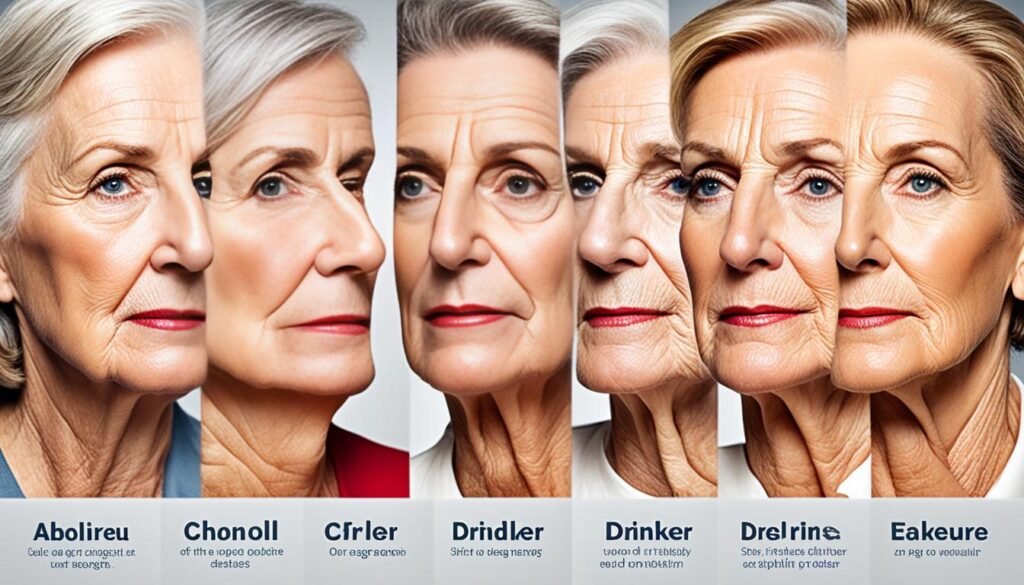
Excessive alcohol consumption can have a significant impact on various aspects of our body, contributing to several aging effects. Let’s explore some of these effects:
Alcohol and Weight Gain
Alcoholic beverages are known to be high in calories, which can contribute to weight gain when consumed excessively. Additionally, alcohol can increase our appetite for fatty and salty foods, leading to unhealthy eating habits. This combination can result in unwanted weight gain and negatively affect our overall body composition.
Alcohol and Hair Loss
Research suggests that excessive alcohol intake can be linked to hair loss. Nutritional deficiencies and hormonal imbalances caused by alcohol can disrupt the natural hair growth cycle, leading to thinning and hair loss over time.
Alcohol and Poor Hygiene
Prolonged heavy drinking can often lead to neglecting personal hygiene. Poor hygiene practices can give rise to cavities, gum disease, and acne, among other skin problems. This neglect can further contribute to an unhealthy and aged appearance.
Alcohol and Body Odor
When alcohol is consumed, it is eliminated from the body through sweat, breath, and urine. This can result in an unpleasant body odor. Continuous excessive alcohol use can exacerbate body odor, making it difficult to combat unpleasant smells through regular hygiene practices.
Alcohol and Cognitive Function
Excessive alcohol consumption can have detrimental effects on cognitive function, including learning and memory. Alcohol affects the brain’s neurotransmitters and can lead to difficulties in concentration, impaired decision-making, and memory loss.
It is crucial to be mindful of the potential aging effects that excessive alcohol consumption can have on our body. Making informed choices regarding our alcohol intake can play a significant role in maintaining our overall well-being and vitality.
Let’s take a closer look at the impact of alcohol on the aging process in Section 6.
How Alcohol Changes the Aging Process
Alcohol consumption can have a significant impact on the aging process, affecting various aspects of both our physical and mental well-being. Two key factors influenced by alcohol consumption are stress hormones and collagen destruction, both of which play vital roles in the aging of our bodies. Let’s take a closer look at how alcohol affects these processes.
The Influence of Alcohol on Stress Hormones
When alcohol is consumed, it can trigger the release of stress hormones in our bodies, such as cortisol. These stress hormones, when consistently elevated due to alcohol consumption, can accelerate the aging process.
“Excessive alcohol consumption can lead to the overproduction of stress hormones like cortisol, which can contribute to premature aging.”
Collagen Destruction and Its Impact on Aging
Collagen is a protein that provides structural support to our skin, keeping it plump, firm, and wrinkle-free. However, alcohol can contribute to the destruction of collagen, leading to a loss of skin elasticity and the formation of wrinkles.
“Alcohol consumption can disrupt the body’s chemical balance, leading to collagen destruction and subsequent signs of aging.”
| Effects of Alcohol on the Aging Process | Description |
|---|---|
| Premature Aging | Alcohol-induced release of stress hormones can contribute to premature signs of aging. |
| Loss of Skin Elasticity | Collagen destruction caused by alcohol can lead to a decrease in skin elasticity. |
| Wrinkle Formation | Collagen destruction can also result in the formation of wrinkles. |
To summarize, excessive alcohol consumption can disrupt the body’s chemical balance, accelerating the release of stress hormones and contributing to the destruction of collagen. These effects can lead to premature signs of aging, loss of skin elasticity, and the formation of wrinkles. It is important to be mindful of our alcohol consumption to minimize its impact on the aging process and maintain healthier, more youthful-looking skin.
The Reversibility of Alcohol-Induced Aging Effects
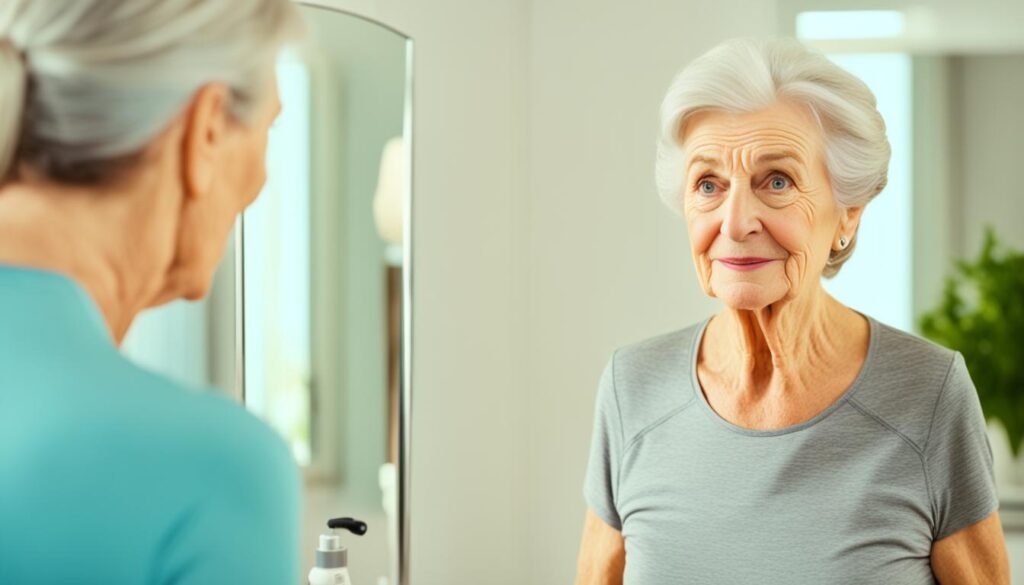
While the effects of alcohol-induced aging can be significant, there is hope for reversal through lifestyle changes. Eating a balanced diet and staying hydrated can help restore the skin’s health and promote regeneration. Seeking medical advice and addressing any underlying health issues, such as thyroid problems caused by alcohol abuse, can also contribute to reversing the aging effects. However, it is important to note that the extent of regeneration depends on the amount of damage that has been done, and some effects may be irreversible.
One way to reverse the aging effects of alcohol abuse is to focus on nourishing the skin from within. A diet rich in antioxidant-rich foods can help combat oxidative stress, which is often accelerated by excessive alcohol consumption. Some examples of antioxidant-rich foods include berries, leafy greens, and nuts. These foods can help repair and protect the skin from the damaging effects of alcohol.
Another vital aspect of reversing alcohol-induced aging effects is maintaining proper hydration. Alcohol consumption can lead to dehydration, which can make the skin appear dull, dry, and aged. By drinking an adequate amount of water daily, individuals can help restore moisture to the skin, improving its overall appearance and elasticity.
Addressing any underlying health issues caused by alcohol abuse is also crucial. For example, excessive alcohol consumption can disrupt thyroid function, leading to hormonal imbalances that can impact the skin’s health and aging process. By seeking medical advice and addressing these issues, individuals can improve their overall well-being and promote the regeneration of their skin.
It is essential to manage expectations when reversing alcohol-induced aging effects. The extent of regeneration depends on various factors, including the duration and severity of alcohol abuse and the individual’s overall health. Some effects may be irreversible, but with commitment to a healthier lifestyle, individuals can still experience significant improvements in their skin’s appearance.
| Lifestyle Changes | Effect on Skin Appearance |
|---|---|
| Eating a balanced diet | Promotes skin regeneration and increases overall vitality |
| Staying hydrated | Restores moisture, improves elasticity, and reduces dullness |
| Seeking medical advice | Addresses underlying health issues and promotes overall well-being |
While the road to reversing alcohol-induced aging effects may require dedication and patience, it is possible to restore the skin’s health and achieve a more youthful appearance through lifestyle changes. By prioritizing self-care and making conscious choices, individuals can take control of their skin’s aging process and improve their overall well-being.
The Benefits of Cutting Down on Alcohol
Reducing alcohol consumption or abstaining from it completely can have a multitude of benefits for your skin health and appearance. By cutting back on alcohol intake, you allow your skin to better retain moisture, leading to improved hydration and a more youthful, plump appearance.
Furthermore, reducing alcohol consumption can help minimize inflammation and redness in the skin, resulting in a more even complexion. The inflammatory effects of alcohol can contribute to skin issues such as acne and rosacea, and reducing alcohol intake can alleviate these concerns.
Not only does limiting alcohol consumption benefit your skin, but it also has positive effects on your overall health and well-being. Alcohol can be dehydrating, leading to dry and dull skin. By choosing to drink less alcohol, you can improve your hydration levels, allowing your skin to achieve a more radiant and youthful glow.
Making the decision to cut down on alcohol can contribute to a more youthful and vibrant appearance. By improving skin health and reducing the visible signs of aging, you can enhance your self-confidence and overall sense of well-being.
Remember, it’s important to prioritize self-care and make choices that support the long-term health and vitality of your skin. By reducing alcohol consumption, you can reap the benefits of improved skin health, a more youthful appearance, and a healthier lifestyle overall.
Conclusion
Excessive alcohol consumption can have a significant impact on the appearance and health of your skin. The effects of alcohol on the skin include premature aging, the formation of wrinkles, loss of elasticity, inflammation, and other skin issues. Understanding the relationship between alcohol and skin aging allows you to make informed choices about your alcohol consumption and lifestyle habits.
By cutting down on alcohol or abstaining from it completely, you can take proactive steps to improve your skin health and promote a more youthful appearance. Decreasing alcohol intake can help the skin retain moisture, enhance hydration, and restore its natural elasticity. Additionally, reducing alcohol consumption can reduce inflammation and redness in the skin, resulting in a more even complexion.
To prioritize the long-term health and vitality of your skin, it is crucial to prioritize self-care and make choices that support its well-being. Being mindful of your alcohol consumption and making positive lifestyle changes can help you achieve healthier skin and a more youthful appearance. So, take control of your skin’s destiny by reducing alcohol consumption and embracing a skin-friendly lifestyle for lasting results.
FAQ
What is the relationship between alcohol and facial aging?
Studies have shown that both smoking and heavy alcohol use can impact facial aging. Smoking is associated with increased severity of wrinkles, crow’s feet, and glabellar lines, while heavy alcohol use is associated with increased severity of upper facial lines, under-eye puffiness, and midface volume loss.
How does alcohol affect the skin and aging?
Excessive alcohol consumption can deplete levels of vitamins, decrease collagen levels, and lead to loss of skin elasticity. It can also cause dehydration, inflammation, and contribute to premature aging of the skin.
What is the impact of alcohol on sleep and skin appearance?
Alcohol consumption can disrupt sleep patterns, leading to puffy eyes and bags, which can make a person appear older and more tired. Lack of quality sleep can also contribute to the appearance of aging.
Does alcohol have any other aging effects on the body?
Excessive alcohol consumption can contribute to weight gain, hair loss, poor hygiene, body odor, and can have negative effects on cognitive function, including learning and memory.
How does alcohol change the aging process?
Alcohol consumption can accelerate the release of stress hormones in the body and contribute to the destruction of collagen, both of which can lead to premature signs of aging. Once collagen is destroyed, it is difficult for the skin to regenerate and regain a youthful appearance.
Can alcohol-induced aging effects be reversed?
While regeneration depends on the amount of damage done, lifestyle changes such as a balanced diet, hydration, and addressing underlying health issues can help improve skin health and promote regeneration.
What are the benefits of cutting down on alcohol?
Cutting down on alcohol consumption can improve skin health, promote a more youthful appearance, and reduce inflammation and redness in the skin. It can also contribute to overall health and well-being.
How does alcohol affect the skin appearance?
Excessive alcohol consumption can have detrimental effects on the appearance of the skin, leading to premature aging, wrinkles, loss of elasticity, inflammation, and other skin issues.

